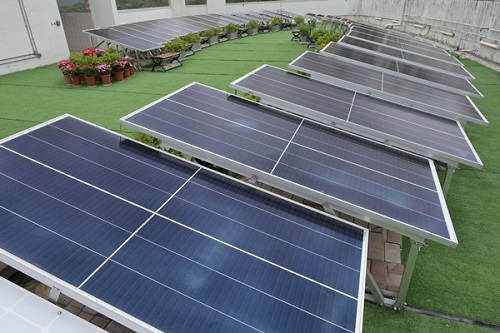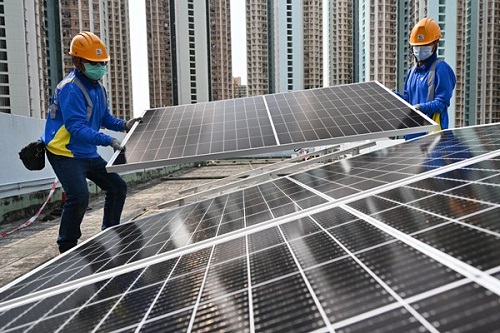|
|||
| HONG KONG | <Search <Archives <eBulletin | ||
May 10, 2021 FiT Scheme received over 500 applications The government is actively promoting the development of renewable energy, with schools and welfare non-governmental organisations joining the league to help combat climate change. Under the Solar Harvest scheme, the Electrical & Mechanical Services Department helps schools and welfare NGOs to install solar energy generation systems at their premises and join the Feed-in Tariff (FiT) Scheme free of charge. Solar Harvest has received an enthusiastic response since its launch in March 2019. As at April this year, the department received more than 500 applications to join the scheme, with more than 90% coming from schools. The department's Building Services Engineer Edward Lee said: “Quite a number of premises have the potential to install the solar energy generation system at their rooftop. However, they are unable to kick-start such an arrangement because of their financial and technical concerns.”
To help alleviate those concerns, the department provides non-government and non-profit-making schools, as well as welfare NGOs receiving recurrent subventions from the Social Welfare Department with a one-stop service. This includes conducting site visits and technical assessments at their premises, drawing up the design of the solar energy generation system, procuring and installing equipment, and conducting system testing.
The department also helps eligible schools and welfare NGOs to join the FiT Scheme of the two power companies.
Under the FiT Scheme, those who install solar photovoltaic or wind power systems at their premises can sell the renewable energy they generate to the power companies at a rate as high as about five times more than the normal electricity tariff rate. Po Leung Kuk Choi Kai Yau School completed installing its system in June last year. Lee explained that on average, each premises with a 10kW solar panel system can generate around 9,000kWh of electricity a year. Other green elements can be incorporated into the installation of the system.
Recyclable aluminium racks were used at the Po Leung Kuk school to support the solar panels, while bricks left over from the school's renovation work were used to add weight to the racks to prevent them from being blown away in strong winds or typhoons. For schools without building materials to spare, the department can still provide them with eco-friendly bricks to use.
The department has completed the installation work at about 170 schools and welfare NGOs. It is estimated that this batch of systems can generate around 1.53 million kWh of electricity each year. According to a school's preference and environment, the department can arrange for the solar panels to be installed in creative styles such as in the shape of a heart or to spell out the school’s initials. The deadline for the new round of applications is July 30. For more details, visit the Electrical & Mechanical Services Department website.
  (Source: HKSARG)
|
|
|
